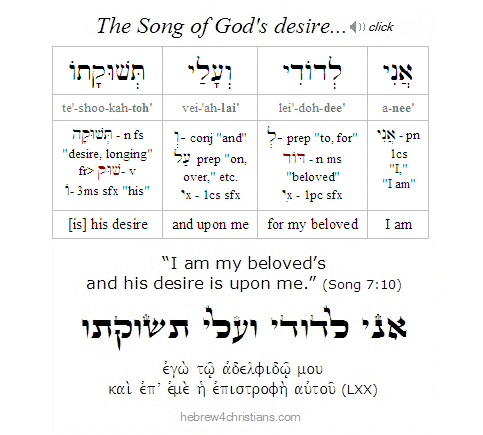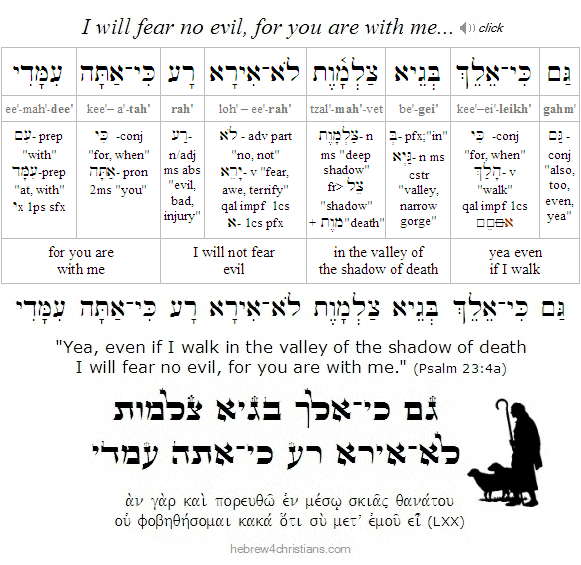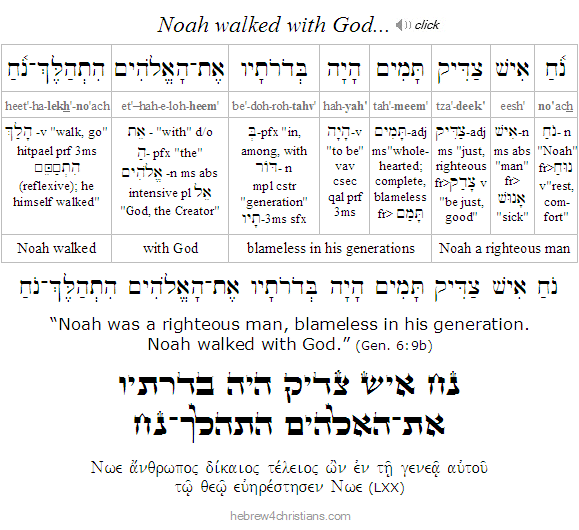|
October 2021 Updates (continued)
Note: If any page content appears to be missing, please refresh the page...
As the Days of Noah...

10.05.21 (Tishri 29, 5782) "For as were the Days of Noah (ימֵי נחַ), so will be the coming of the Son of Man. For as in those days before the flood they were eating and drinking, marrying and giving in marriage, until the day when Noah entered the ark, and they were unaware until the flood came and swept them all away" (Matt. 24:38-9). Yeshua told us that the "Days of Noah" were marked by people who were asleep, blind, and unaware (ἔγνωσαν, "agnostic") of spiritual truth. They lived their days oblivious to Reality. They "forgot" who God was, who they were, why they existed, and where they were going. They engaged in deception, violence, theft, and rampant promiscuity. Such is our world today...
The deadening effects of sin leads to moral and spiritual blindness that leads to corruption and unthinking brutality and violence. Of Noah's generation it was written that "the whole earth was corrupt before God, and filled with violence" (Gen. 6:11). Rashi understood the word "corruption" (shachat) to primarily refer to sexual immorality (i.e., idolatry) and "violence" (chamas) to primarily refer to theft and robbery. In general, however, the sages regarded the word chamas to refer to lawlessness, that is the denial of Torah, and consequently the benighted condition of living without yirat ha-shamayim (awe of heaven). When people are spiritually dead, they are unconscious of the wonder of God; oblivious to what is real; and they are consequently debased into mere animals...
Hebrew Lesson:
Gen. 6:11 Hebrew reading (click):
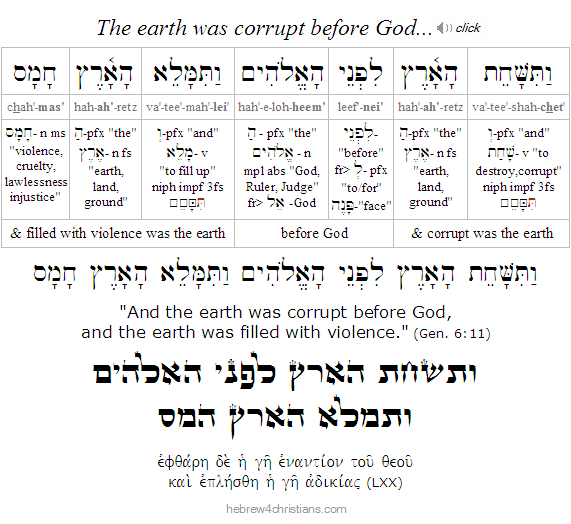 |
Captives to Hope...
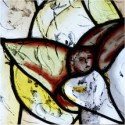
10.05.21 (Tishri 29, 5782) Many people want healing apart from the cure. How many settle for half-measures? While you might find respite for your suffering in temporary measures, you cannot have lasting healing apart from the divine remedy...
God gives us special graces, especially in light of the passing of days, with thwarted hope, aching bones, and inner keening for lasting deliverance from the insanity of this world. This gift of despondency helps us to awaken and to reach out to find the Real, the True, the Eternal. Learn to wait; ask God for the wisdom of patience. Between acceptance and anxiety, always choose acceptance. Find hope while waiting...
An old Jewish prayer, uttered somewhat wistfully, begins, "O Lord, I know that Thou wilt help us; but wilt Thou help us before Thou wilt help us?" It's not always easy to wait for God, especially when we are in pain or anxiety, but we must never, ever, give up; we must never ever, abandon our heart's longing for ultimate healing. Faith excercises hope in the Reality, Substance, and Being (ὑπόστασις) of the Invisible and is made captive to undying hope (Heb. 11:1). Therefore the Spirit cries out: "Wait for the LORD; be strong and he will strengthen your heart; and (again) wait for the LORD" (Psalm 27:14).
Hebrew Lesson:
Psalm 27:14 Hebrew reading lesson:
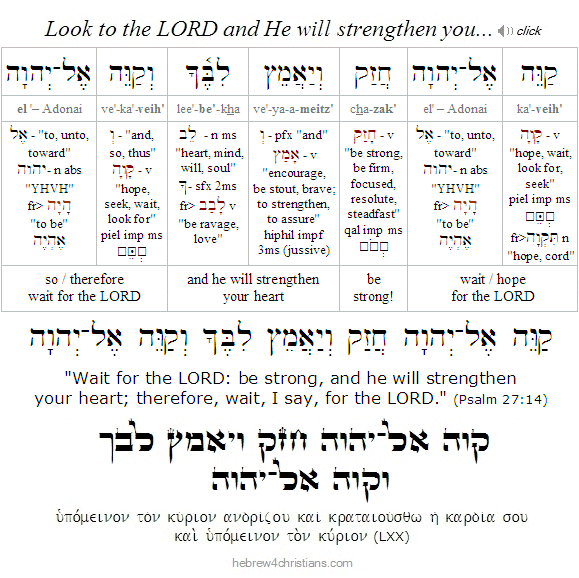 |
In this verse, the imperative verb translated "wait" is the Hebrew word kaveh (קַוֵּה), which might better be rendered as "look for with anticipation!" or "hope!" (the same root appears in the Hebrew word for hope, i.e., tikvah: תִּקְוָה). Therefore hope in the Lord and "chazak!" - be strong! (the Septuagint translates chazak as "andridzou" (ἀνδρίζου - act like a man!). Note that the verb ve'ametz is a causal active stem (i.e., Hiphal) in the "jussive mood," which means it is imperative – "command your heart to be strengthened," or "let your heart be made strong!" Make the decision to be strong in the LORD, and the LORD will give you strength to bear your present suffering: "Look to the LORD (קַוֵּה אֶל־יְהוָה) and find hope."
בָּרוּךְ אַתָּה יהוה אֱלהֵנוּ מֶלֶךְ הָעוֹלָם
אֲשֶׁר עָשָׂנוּ אֲסִירֵי תִּקְוָה
ba·rookh · a·tah · Adonai · E·lo·hei'·noo · me'·lekh · ha·o·lahm
a·sher · ah·sah'·noo · a·see·rei · teek·vah

"Blessed are You, LORD our God, King of the universe,
who has made us captives of hope."

When we put our hope in the LORD, strong in our conviction, we will be given courage to bear whatever may befall us - and this is help indeed during these perilous days! So "hope to the LORD (קַוֵּה אֶל־יְהוָה); be strong and strengthen your heart; and (again) hope to the LORD." There can be no turning to God without genuine hope (תִּקְוָה). Indeed, as the Apostle Paul wrote: "We are saved by hope" (Rom. 8:24).
The Song of Desire...

10.05.21 (Tishri 29, 5782) The midrash says that the word "bereshit" (בְּרֵאשִׁית) can be arranged to spell shir te'ev (שִׁיר תְּאֵב), meaning the "song of desire." This is the holy plea sounded by all of creation to be made whole, healed, and ultimately perfected. As it says in our Scriptures: "For the creation was subjected to futility, not willingly, but because of him who subjected it in hope" (Rom. 8:20). Therefore when we take hold of Yeshua's heart, vision, and mission, we partake in the repair of the world (תיקון עולם) by testifying of God's healing love given in Messiah. We begin and end our journey to life with the "song of desire" on our lips – that is, with our heart awakened to its need for God. As it says: "The LORD is near to all who call on him, to all who call on him in truth. He fulfills the desire of those who fear him; he also hears their cry and saves them" (Psalm 145:18-19).
Hebrew Lesson:
Song 7:10 Hebrew reading Lesson (click):
Our Good Shepherd...
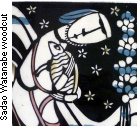
10.05.21 (Tishri 29, 5782) The walk of faith is one of "holy suspense," trusting that God is on the other side of the next moment, "preparing a place for you" (John 14:3). In the present, then, we live in unknowing dependence, walking by faith, not by sight. For "hope that is seen is not hope; for who hopes for what he sees?" (Rom. 8:24). This is the existential posture of faith - walking in darkness while completely trusting in God's daily care. Our task at any given moment is always the same - to look to God and to accept His will. This is where time and eternity meet within us, where God's kingdom is revealed in our hearts. Therefore our Good Shepherd Yeshua taught us: "Don't be anxious about tomorrow, for tomorrow has its own troubles. Live one day at a time" (Matt. 6:34).
יְהוָה רעִי לא אֶחְסָר
בִּנְאוֹת דֶּשֶׁא יַרְבִּיצֵנִי
עַל־מֵי מְנֻחוֹת יְנַהֲלֵנִי
נַפְשִׁי יְשׁוֹבֵב
יַנְחֵנִי בְמַעְגְּלֵי־צֶדֶק לְמַעַן שְׁמוֹ
Adonai · roh·ee · lo · ech·sar
bee·noht · de'·she · yar·bee·tzei'·nee
al-mei · me·noo·choht · ye·na·cha·lei'·nee
naf·shee · ye·sho·vev
yan·chei'·nee · ve·ma·a·ge·lei · tze'·dek · le·ma'·an · she·mo

"The LORD is my shepherd; I shall not want.
He makes me lie down in green pastures.
He leads me beside still waters.
He restores my soul.
He leads me in paths of righteousness for his name's sake."
(Psalm 23:1-3)

Hebrew Study Card
"Yea, even if I walk in the valley of the shadow of death, I will fear no evil, for you are with me" (Psalm 23:4). O God of Light, Light of the world, surely You know my need for light as I look to You, especially when darkness tries to extinguish my hope. Despite my inability to see you now, help me to know that you are with me; let "thy rod and thy staff comfort me" and lead me closer to you. Lord, when I am afraid, quicken the faith you have put within my heart. Be Thou my Shepherd in my darkness, O Lord my God...
Hebrew Lesson:
Psalm 23:4a Hebrew reading (click):
The heart of faith senses the LORD's presence, even in the darkness, and hears the Spirit saying, "I am with you..." Love hopes all things and believes even in the midst of troubles.
I do not see the road ahead of me, I cannot know for certain where it will end. Nor do I really know myself, and the fact that I think I am following your will does not mean I am actually doing so. But I believe the desire to please you does in fact please you, and I hope I have that desire in all that I am doing. I hope that I will never do anything apart from that desire. And I know that if I do this you will lead me by the right road, though I may know nothing about it. Therefore, I will trust you always, though I may seem to be lost and in the shadow of death. I will not fear, for your are ever with me, and you will never leave me to face my perils alone. -- Thomas Merton: Seeds of Contemplation
"Who among you fears the LORD and hears (שָׁמַע) the voice of his Servant? Let him who walks in darkness and has no light trust in the Name of the LORD and rely on his God... I will lead the blind in a way that they do not know, in paths that they have not known I will guide them. I will turn the darkness before them into light, the rough places into level ground. These are the things I do, and I do not forsake them" (Isa. 50;10; 42:16).
Temptation in the Garden...
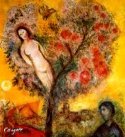
10.05.21 (Tishri 29, 5782) When Adam was put in the Garden of Eden, God told him that he was free to eat from any tree in the Garden except from "the Tree of the Knowledge of Good and Evil" (עץ הדעת טוב ורע), which logically implies that evil existed before that time. After all, the knowledge of something assumes the existence of that thing, and if there was knowledge of evil, then evil would exist, at least potentially... If we understand evil (in this context) as a volitional act of disobedience to God's will, the existence of moral agency that could disobey the divine imperative must be assumed. And since the angels were created before the earth was created (Job 38:4-7), then Satan, understood to be an angelic being, had rebelled against God some time before the original prohibition was given to Adam and Eve. Good and evil are therefore terms defined in relation to the person and nature of God: that which is "good" is what God reveals as good, and that which is evil is the negation (or privation) of that good. God's inherent goodness is non-derived and absolute, however, and therefore there is no standard "above" God that determines his judgment about what is good and what is evil. God is the source of all goodness, whereas the "sitra achra" (סִטְרָא אָחֳרָא), or the "other side" of God's will, is the realm of evil or demonic powers....
Now some time after Adam and Eve were created, then, a mysterious being called "the serpent" (or "nachash") appeared in the Garden tempting them to do evil by disobeying God. In the Torah we read: "Now the serpent was more "subtle" or "cunning" (עירם) than any other beast of the field that the LORD God had made" (Gen. 3:1). Notice that while the serpent was described as "cunning," he had disguised himself as a "beast of the field" (חַיַּת הַשָּׂדֶה). In his ploy to sabotage God's crowning act of creation, he slyly pretended to be a humble animal that was curious about God's appointed king and queen over the earth. "Was it really true," the serpent began, "that God said you shall not eat from any tree of the garden?" Undoubtedly the serpent deliberately misrepresented God's will as he set his bait. Eve responded to the question by correcting the beast, teaching him that they were allowed to eat fruit from any of the trees in the garden except for the tree in its midst. She then recalled God's commandment, saying: "You must not eat from it, and you must not touch it, or else you will die" (Gen. 3:2-3). In this connection note that Eve had misquoted the commandment by adding the prohibition not to touch the tree, something God did not say (Gen. 2:16-17).
At any rate, the serpent, seizing the opportunity to exploit Eve's overstatement, then directly contradicted her understanding of the matter: "You shall not surely die!" He then insinuated that God's ulterior motive was to restrict access to the Tree because it would cause their eyes to be opened so they would become like God, knowing the difference between good and evil. It is telling that the serpent accused the Creator with being envious, since that is how he rationalized his own decision to turn away from God, thinking that God did not want to share his glory with any other being than himself (Isa. 14:14).
The trap having been set, Eve became ensnared by doubt. First she began looking the tree over and saw that it bore pleasant fruit; then she recalled the serpent's praise of the fruit of the tree as the means of gaining god-like insight about good and evil, and finally, in her desire, she took some of the fruit, ate it, and gave some to her husband who was with her. The effect of their transgression was apparently immediate: "The eyes of both were then opened, and they knew that they were naked (עירם); and they sewed fig leaves together and made themselves coverings" (Gen. 3:7).
The serpent had spoken a partial truth: their eyes were opened, but when they saw their own inner evil, they were ashamed. They went dark; they withdrew into lonely and fearful exile. They wanted to hide the truth from themselves and from God himself.
Later, when Adam and Eve heard the sound of God walking toward them in the garden, they attempted to hide themselves among the trees. The Lord then called out, "Ayekah?" Where are you?, though of course he knew exactly where they were hiding. God was calling out to his lost children, asking them to turn back to him. Adam then stepped out from among the trees, covered with fig leaves, and anxiously said, "I heard your voice but I was afraid because I was naked..." (Gen. 3:10).
Recall that when God had created Adam and Eve they were "naked but not ashamed" (Gen. 2:25), but now, after their transgression, their nakedness became a source of fear. Their innocence was lost and this led them into a shattered state of anxiety and self-awareness.
The "original sin" is depicted as eating from the fruit of the "Tree of the knowledge of good and evil," the access of which was gained by means willful disobedience to God, and the consequence of which was separation from God, or "spiritual death." Note that the effect of the curse of spiritual death was "passed down" to the progeny of Adam and Eve as a lethal condition judicially derived from the original transgression in the Garden. In other words, since Adam and Eve functioned as "federal heads" of the human race, their sin was consequently imputed and transmitted to the rest of humanity, as it is written: "Therefore, just as sin came into the world through one man, and death through sin, so death spread to all men because all sinned" (Rom. 5:12).
It is interesting that the same Hebrew root (i.e., ערם) is used to describe both the "cunning" of the serpent (Gen. 3:1) and the "nakedness" of Adam and Eve after their sin (Gen. 3:7). In Satan's case, God exposed his pride which resulted in exile from the heavenly realm (Isa. 14:12-15; Ezek. 28:12-14). After his fall, the "nakedness" of Satan led to the shameless "celebration" of lawlessness and the cunning devices of evil. In the case of Adam and Eve's fall, however, the "uncovering" resulted in exile from the Garden and the shame and fear derived from their own wicked hearts. In both cases, however, the root cause of evil was pride that exalted the will of creature above that of the Creator, and in both cases the consequence of usurping God's authority resulted in judgment and spiritual death. God's judgment upon Satan, however, was irrevocable, since Satan had "nakedly" sinned before the Divine Presence in the realm of the eternal, whereas Adam's judgment was provisional until the coming of the Savior, who would overthrow Satan's claim to be the federal head of fallen humanity by means of the perfect obedience and sacrifice of the "Last Adam," the Son of Man, who would withstand the temptation of the evil one and gain the victory on our behalf. God signified the promised ransom to come by graciously clothing Adam and Eve with the skin of the first sacrificed animal, offered by God himself, in anticipation of the Lamb of God who would take away the sins of the world (Gen. 3:21).
Hebrew Lesson:
Psalm 119:37 Hebrew reading (click):
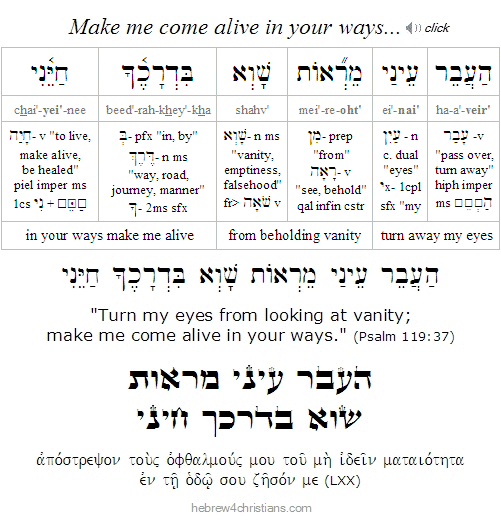 |
Healing from our Exile...
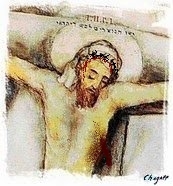
10.04.21 (Tishri 28, 5782) Our restoration begins with God's love and passion. God's first question to Adam after he broke covenant was: "Where (אַיֶּכָּה) are you?" - the voice of a loving Father in search of his son (Gen. 3:9). Of course God knew exactly how his son was attempting to hide, though He almost acted as if He was unwilling to believe that he would betray his love by disobeying His commandment. Therefore God's poignant question was directed to Adam's heart: "Oh my son, how did you get to this place?" God was giving Adam an opportunity to turn back to Him, to confess the sin, to undergo teshuvah, to become reconciled... This is the necessary prelude to any honest relationship with God.
Recall that the original promise of the coming Savior was given within the context of the curse and judgment upon Satan: "I will put enmity between you and the woman, and between your seed and her seed; he shall crush your head, and you shall crush his heel" (Gen. 3:15). That God's promise was first directed to Satan is surely by design, since he "left his first estate" by becoming the "monster in the garden" and was therefore primarily responsible for the transgression of Adam and Eve in the first place (Ezek. 28:13-15,19). The promise delivered to Satan was therefore one of coming retribution and divine judgment: Evil would not have the last word in the matter of mankind, and therefore Satan's schemes would be avenged by God in the fullness of time (Gal. 4:4-5). Notice, however, that Adam and Eve were not yet judged for their sin when the LORD God gave the promise of the coming of the Redeemer. Before a word of judgment was directed toward them, God's love and light was already revealed. Indeed, immediately after their judgment was pronounced, "the LORD God made tunics of skin for Adam and his wife and clothed them" (Gen. 3:21) - a clear picture of being compassionately "robed in righteousness" imparted by an innocent sacrifice. The very first sacrifice recorded in the Torah - performed by God Himself - prefigured the coming redemption by the "seed of the woman" who would die as a substitutionary sacrifice for their sins, and therefore Yeshua is rightly called "the Lamb slain from the foundation (or beginning) of the world" (Rev. 13:8). This further explains why Eve's son (Abel) offered a blood sacrifice that was accepted by the LORD, whereas Cain's offering the "fruit of the earth" was rejected.
The very first prophecy of Torah therefore describes - in the most succinct form - the coming of the Savior and the great conflict of the ages. First, God declares that He would put enmity (אֵיבָה) between Satan and the woman. This enmity, or "hostile hatred," was based on the memory of Eve's misguided trust she evidenced in the garden. When Eve first sympathetically listened to the lies of the nachash (serpent), she immediately began her descent into exile and became a temptress herself. Her first step toward sin was a gullibility or openness that ultimately resulted in a lack of trust of God (which is part of the reason why we must be saved by trusting, as a "like-for-like" reversal of the original sin). At the very dawn of human history, then, we see that "truth" (אֱמֶת) apart from God (א) leads to death (מֵת). Eve was deceived because of Satan, but Adam deliberately chose to disobey God (2 Cor. 11:3; 1 Tim 2:14). In response to her teshuvah (repentance), God blessed Eve before He judged her by imparting to her a God-given hatred for Satan and his lies, as well as the promise that she would take part in the birth of the Savior of mankind. The first promise of the gospel, then, focused on the woman and her role in the coming redemption. Notice that Adam later renamed his wife Eve (i.e., Chavah: חַוָּה, the "mother of life") as an expression of his faith that the promised seed would come through her.
Hebrew Lesson:
Genesis 3:15b Hebrew reading (click):
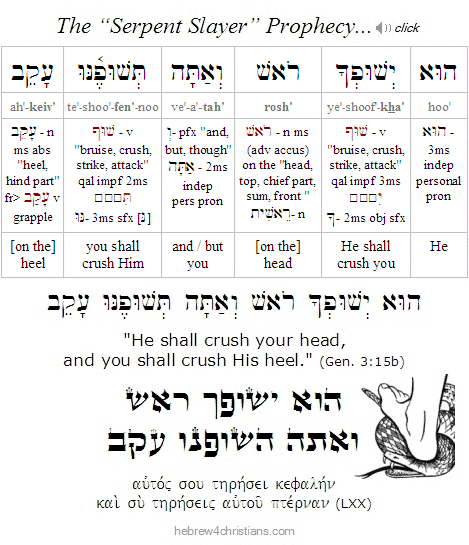 |
Design and Substance...
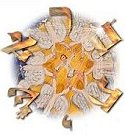
10.04.21 (Tishri 28, 5782) "In the beginning God created the heavens and the earth, and the earth was "tohu va'vohu" - without form and empty, and darkness was over the face of the deep..." (Gen. 1:1-2). The sages comment that knowing that God created the heavens and the earth makes us realize that by themselves earthly things are without purpose and substance, since life in the natural world is havel havalim (הֲבֵל הֲבָלִים), "vanity of vanities," apart from the design (form) and the substance of God. Faith in the upper "world" of God, that is, the heavenly realm, therefore evokes a sense of discontent and longing within the soul, and the temporal world and its pleasures will seem distracting and empty. This lack of form and emptiness was part of the original design of creation, however, since it was after God had created the universe that "he saw everything that he had made, and behold, it was very good" (Gen. 1:31).
Just as we cannot see light but by means of it we see other things, so with Yeshua, the Light of Life, the Form and Substance of God... By His illumination we are able to see the spiritual reality of God's Presence and invincible love... Yeshua is "the radiance of the glory of God and the exact imprint of his nature, and he upholds the universe by the word of his power" (Heb. 1:3). He is the Fountain of Life: by his light we see light (Psalm 36:9). Amen, God is light, and in Him is no darkness at all (1 John 1:5).
Hebrew Lesson:
Psalm 36:9 Hebrew reading (click):
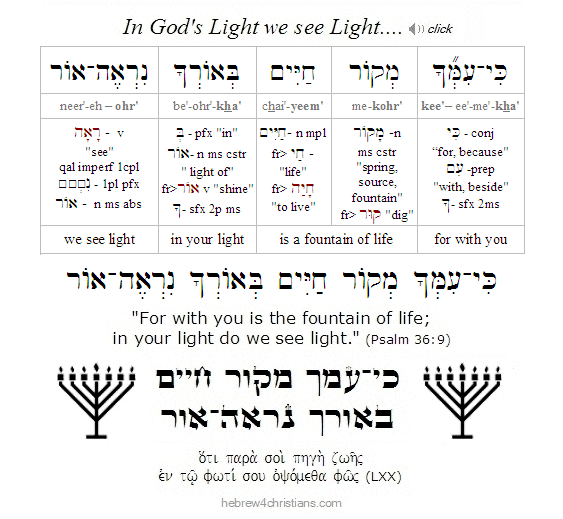 |
Note that some teachers claim that there was a "gap" in time between Gen. 1:1 and 1:2 in which the devil rebelled and a cosmic war between good and evil occurred that resulted in the fall of Satan. According to this view, God "started over" by saying yehi ohr, "Let there be light" (Gen. 1:3). There is no textual evidence for such a gap, however, and indeed there are reasons to reject this view as mistaken. First, the Ten Commandments state that God created all that existed - including time, space, angels - in six days (Exod. 20:11; John 1:3). Second, the devil could not have fallen before the creation since he was created "an anointed covering cherub" while in the original paradise (see Ezek. 28:13-15). Third, the taunt of the fall of the King of Babylon prefigured the fall of Satan, where the pride of the evil one was exposed: "You said in your heart, 'I will ascend to heaven; above the stars of God I will set my throne on high; I will sit on the mount of assembly in the far reaches of the north; I will ascend above the heights of the clouds; I will make myself like the Most High' (Isa. 14:13-14). Notice that the desired ascent was above the stars, above the clouds, etc., all of which were created when God made the expanse (Gen. 1:14-18). Finally, the Scriptures state that there was no sin or death until man brought them into the world (Rom. 5:12), and, since Torah tells us everything was very good at the end of the creation week (Gen. 1:31), Satan must have fallen after Adam was created.
Creation and Rest...

10.04.21 (Tishri 28, 5782) The general account of creation ends: "So God blessed the seventh day and set it apart as as holy (וַיְבָרֶךְ אֱלֹהִים אֶת־יוֹם הַשְּׁבִיעִי וַיְקַדֵּשׁ אֹתוֹ), because on it God rested (i.e., shavat: שָׁבַת) from all his work that he had created to do" (Gen. 2:3). Here we note that rest (shevat) should not be thought of as idleness, that is, the mere cessation of work, since the divine rest is blessed and introduces a higher-level of existence, above the natural realm. This is likened to the "hidden blessing" that no manna fell on Sabbath so that what had been accrued could be used at that time (Exod. 16:25). The midrash says here that God rested only from the "work of this world," but not from the work of heaven, that is, the ongoing work of sustaining creation by the word of his power, caring for the righteous and judging the wicked, feeding the birds and watering the lilies of the field (Matt. 6:26-29, Heb. 1:3; Col. 1:16-17). "Yea, He that keeps Israel shall neither slumber nor sleep" (Psalm 121:4). Therefore it was on the Sabbath day that Yeshua asked the paralytic man, "Do you want to be healed?" and then instructed him to take up his mat and walk (John 5:1-9). To those religious gatekeepers who accused him of "breaking the Sabbath" because he did this, Yeshua said, "My Father is working until now, and I am working too," a statement that enraged them, since they understood that Yeshua was making himself equal with the LORD God Himself (John 5:17-18).
Hebrew Lesson:
Deut. 5:12 Hebrew reading (click):
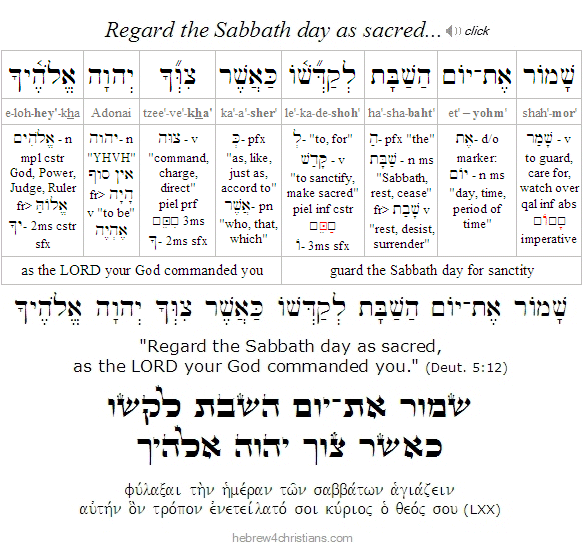 |
But what about this matter of Sabbath observance? Did Yeshua "break the Sabbath" as he was accused or did he rather have a different understanding of its true meaning? When he was criticized by the Pharisees for allowing his disciples to pick some grain from the fields on the Sabbath, he responded that the Scriptures themselves testified that King David "broke the commandment" by eating the sacred bread reserved for the priests (i.e., the "showbread"), and noted that the priests likewise "profaned" the Sabbath by performing their avodah (service) at the Temple (Matt. 12:1-5). Yeshua then stated that "someone greater than the Temple is here" and went on to chastise his accusers by pointing out that the deeper principle of the Torah is to show mercy before sacrifice (see Hos. 6:6, Psalm 51:16-17, Prov. 15:8, Matt. 9:13, etc.). As the very "Lord of the Sabbath" (i,e., אֲדוֹן הַשַּׁבָּת, Matt. 12:8), Yeshua sanctioned acts of mercy and compassion to be performed on the consecrated day of rest. Indeed, just as the law permitted a male to be circumcised or an animal to be pulled out of a well on this day, for all the more reason should a person be healed on the Sabbath (Matt. 12:11-13). The Sabbath is therefore not a day of (static) rest (or "non-doing") but is a means of providing rest for others by doing gemilut chasadim, that is, acts of chesed and mercy. Again, the Pharisees and religious authorities had confused the "inner" with the "outer" and made a category mistake, and therefore Yeshua axiomatically said: הַשַּׁבָּת נֶעֶשְׂתָה לְמַעַן הָאָדָם וְלֹא הָאָדָם לְמַעַן הַשַּׁבָּת - "the Sabbath was made for man, and not man made for the Sabbath" (Mark 2:27). Of our Savior it was prophetically said: "Out of the ground that the LORD has cursed, this one shall bring us comfort (נָחַם) from our work and from the painful toil of our hands" (Gen. 5:29).
Olam Malei - An Entire World...

10.03.21 (Tishri 27, 5782) God made you entirely unique, and no one else was created for the special role that you have in the overarching plan of Almighty God... Jewish tradition says that God created Adam alone as "olam malei" (עוֹלָם מָלֵא), "an entire world," to teach that each individual is of great value and significance. "Thus anyone who sustains one individual has sustained the world; and anyone who destroys one individual has destroyed an entire world" (Sanhedrin 37a). In addition, God created man as a solitary creation to remind us that all people descend from a common source: No one has a greater or better lineage or "pedigree" than anyone else. Moreover, each of us is created with a radical sense of "aloneness," a built in "hunger" for relationship and especially for God's presence. Therefore the very first commandment to Adam and Eve comes in the form of a blessing: "And God blessed them (וַיְבָרֶךְ אֹתָם) and said, פְּרוּ וּרְבו / pe'ru ur'vu: "be fruitful and multiply" (Gen. 1:28). This teaches us that people were created to be in fellowship with others and with God, but when this is lacking, there is a profound soul hunger and need...
Hebrew Lesson:
Isa. 43:21 Hebrew reading (click):
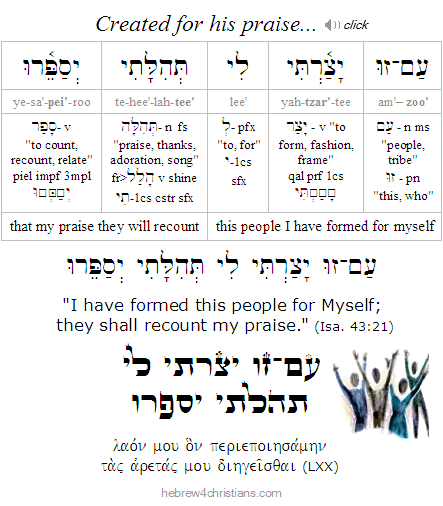 |
Chodesh Cheshvan....
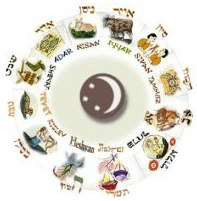
10.03.21 (Tishri 27, 5782) On the Biblical calendar, the month of Cheshvan (חֶשְׁוָן) immediately follows the "holiday month" of Tishri, and begins Tuesday, October 5th (at sundown) this year. The Torah records that God brought down the Great Flood that destroyed the world on Cheshvan 17 (Gen. 7:10-11), which lasted until Cheshvan 27 of the following year (Rashi notes that the 11-day discrepancy between the 17th and 27th represents the 11-day difference between the solar and lunar calendar year). Because Noah's Flood began and ended during this month, Cheshvan is generally regarded as "mar" - a time of judgment, especially regarding water (rain). Cheshvan always has a two-day Rosh Chodesh. Because rain is central to the health of the spring crops, on the 17th of the month those living in Israel begin requesting rain by adding vetein tal u'matar librakha ("and grant dew and rain for blessing") to the Amidah prayer.
יְהִי רָצוֹן מִלְּפָנֵיךָ יהוה אֱלהֵינוּ
וֵאלהֵי אֲבוֹתֵינוּ שֶׁתְּחַדֵּשׁ עָלֵינוּ חדֶשׁ טוֹב
בַּאֲדנֵינוּ יֵשׁוּעַ הַמָּשִׁיחַ אָמֵן
ye·hee · rah·tzohn · meel·fah·ney·kha · Adonai · E·loh·hey·noo
vei·loh·hey · a·voh·tey·noo · she·te·kha·deish · ah·ley·noo · khoh·desh· tohv
ba'a·doh·ney·noo · Ye·shoo·a' · ha·mah·shee·akh · ah·mein

"May it be Your will, LORD our God and God of our fathers,
that you renew for us a good month in our Lord Yeshua the Messiah. Amen."

Download Study Card
Parashat Noach (פרשת נח)
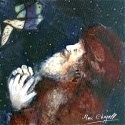
10.03.21 (Tishri 27, 5782) Last week's Torah portion (Bereshit) showed how the mutiny of Adam and Eve caused humanity to plunge into idolatrous chaos. The subsequent generations lost sight of the LORD and became progressively steeped in moral anarchy and bloodlust, so that "every intention of the thoughts of man's heart was only evil continually" (Gen. 6:5). After just nine generations, the LORD had grown so weary of humanity that he "regretted" (i.e., yinchem: יִּנָּחֶם) creating man and "his heart was grieved" (Gen. 6:6). However, God recognized Noach (from the godly line of Seth) as a tzaddik (צַדִּיק), a righteous man of faith, and graciously made provision to save him from the wrath to come....
Noah's father Lamech (לֶמֶךְ, "powerful one") regarded his son as a deliverer who would comfort humanity from the ravages of the original curse. Noach would give rest (נוּחַ) from the toil and vexation of life (Gen. 5:29). Symbolically Noah was a "type" of the Savior to come who would rebirth the world by giving lasting comfort and rest (for more on this, see "Noah and Jesus"). In like manner it was prophesied that Yeshua would give us everlasting rest: "His rest shall be glorious" (Isa. 11:10), just as He offers rest to the weary (Matt. 11:28, Heb. 4:9). His sacrifice on the Cross at Moriah undoes the kelalah (curse of work) over the children of Adam. Indeed, His life, sacrifice, and resurrection was like a "magic spell" that "spoke backwards" the sin of the "First Adam" - and by means of His deliverance the power of the curse is forever broken (see Gal. 3:13, John 3:14, 2 Tim.1:10; Heb. 2:14; Heb. 9:27-28; 1 John 3:8, Rev. 22:3). Yeshua is Adam ha-Sheni - the "Second Adam" - the promised Son of Man. By means of His Spirit we are given an everlasting comfort (John 14:16).
Eschatologically, the "days of Noah" present a picture of the idolatrous conditions of the world that will prevail just before the calling up of the followers of Yeshua before the time of Great Tribulation upon the earth: "As were the days of Noah, so will be the coming of the Son of Man" (Matt. 24:37). The generation of the Flood was said to be "filled with violence" (Gen. 6:13) caused by ignorance -- literally the "state of ignoring" moral and spiritual truth. Because people willingly disregarded God from their midst, they arrogated to themselves divine prerogatives: "every man did what was right in his own eyes." The resulting moral corruption and anarchy led to divine and catastrophic judgment: the world returned to its primordial state of tohu va'vohu v'choshekh: "confusion and emptiness and darkness" (Gen. 1:2). Notice, however, that despite the godlessness and lawlessness that prevailed, the "days of Noah" were not marked by overt "tribulation," since people were eating and drinking, marrying and giving in marriage, until the day that Noah entered into the ark, "and they were unaware" (καὶ οὐκ ἔγνωσαν) until the flood came and swept them all away -- so will be the coming of the Son of Man (see Matt. 24:38-39). In other words, the "end of the world" judgment fell suddenly and took them by surprise...
The seven day warning given to Noah further suggests the seven year tribulation period to come (i.e., Daniel's 70th week), and also the "rapture" of the people of God who will be carried above the prophesied worldwide cataclysm. Just as God protected Israel during the time of judgment upon Egypt, so He will protect His people from the wrath of the "great Day of the LORD." But please note that "the LORD shut him in" (Gen. 7:16). Noah's teivah (ark) had God Himself as its designer (Gen. 6:15f), just as salvation in Messiah is by God's design (Jonah 2:9; Eph. 1:9, 1:11). It contained only one door (Gen. 6:16), just as Yeshua is the only door to salvation (John 10:9; 14:6). Noah's ark contained three levels (Gen. 6:16) and salvation has three own experiential levels (2 Cor. 1:10): past, present, and future. In the past (at Moriah) Yeshua delivered us from the penalty of sin; in the present, He is delivering us from the power of sin; and in the future He will deliver us from the very presence of sin. Baruch Hashem - may that day come soon!
Hebrew Lesson:
Genesis 6:9b Hebrew reading (click):
The Dust of God....
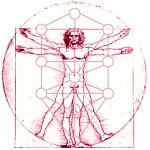
[ The following is related to last week's Torah portion, parashat Bereshit... ]
10.01.21 (Tishri 25, 5782) "Then the LORD God formed the man from dust of the ground and breathed into his nostrils the breath of life, and the man became a living soul" (Gen. 2:7). We tend to think of dust in self-effacing terms; for example, repenting in "dust and ashes" expresses unworthiness and sinfulness. Yet the dust God used to form Adam was not worthless, but instead represented very fine particles of creation, a substance suspended midway between heaven and earth, almost a "spiritual matter." This is suggested by the fact that God first intended man to be his image bearer and only then used dust as the material for that higher end. The sages note that regarding the creation of animals, God said, "Let the earth (eretz) bring forth according to their kinds" (Gen. 1:24), but regarding man he said, "Let us make him be'tzelmeinu - in our image (as a photograph), after our likeness" (Gen. 1:26). Therefore God brought forth the lower animals in groups, but he created Adam as the only one of its kind, the son of God and prince of God's creation. God breathed into Adam nishmat chayim (נִשְׁמַת חַיִּים), "a living soul" (the word neshamah [נשָׁמָה] is used to describe life breathed into humans, not to animals). The LORD breathed "out of himself" to share his own spirit with mankind... Therefore your soul does not come from nature, but from God; your inner essence originates directly from the LORD...
Hebrew Exegesis:
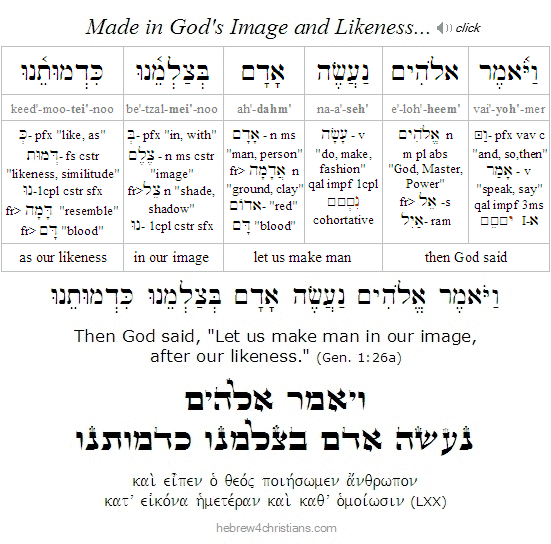 |
The Root of Sin and Death...

[ The following is related to this week's Torah portion, parashat Bereshit... ]
10.01.21 (Tishri 25, 5782) The commandment prohibiting eating from the Tree of Knowledge of good and evil (עֵץ הַדַּעַת טוֹב וָרָע) contained all other Torah commandments by implication (Gen. 2:17). The commandments not to worship idols, not to curse God, not to steal, not to kill, not to commit adultery, not to covet, and to enforce justice all derive from this primary commandment given in the garden. After all, Adam lost awareness of God by focusing on himself (idolatry) and failed to express love and reverence for God (profanity); he took from the Tree what was forbidden (coveting/stealing) which led to his own death (killing) and his own inner promiscuity (adultery). He failed to be vigilant and exercise justice by removing the presence of the tempting snake... Notice how these implications form the basic categories of the Ten Commandments, as well as the 613 commandments given later at Sinai. Looked at the other way, all of the commandments of Torah were concentrated into this single prohibition, since had Adam refrained from eating, he likewise would have refrained from all the other sins derived from this first great transgression. Moreover, since the essence of Torah is to trust God (i.e., "the righteous shall live by his faith"), when Adam sinned, he lost faith and the exile began... The Tree of Knowledge of good and evil is really the tree of the knowledge of sin and death. Just as the law defined sin to reveal our lethal spiritual condition, so the Tree of Knowledge led to the consequence of death and the revelation of our need for healing and deliverance given by Yeshua. "The law of the Spirit of life sets you free in Yeshua the Messiah from the law of sin and death" (Rom. 8:2).
The root of sin and death is found in the desire for "the knowledge of good and evil," that is, by seeking that which what defines sin, or that which is not God's will... It is the attempt to transcend God's moral authority for something beyond his sovereign good for us, and as such it denies reality and leads to exile and death. In this connection we note that the Hebrew phrase that warns of the consequence of eating from the Tree is mot tamut (מוֹת תָּמוּת), meaning "in dying you will die," which both implies the spiritual nature of death as separation from the divine life, but also the repeated experience of death – the ongoing knowledge of decay, dissolution, and loss...
Hebrew Lesson:
Gen. 2:17 Hebrew reading (click):
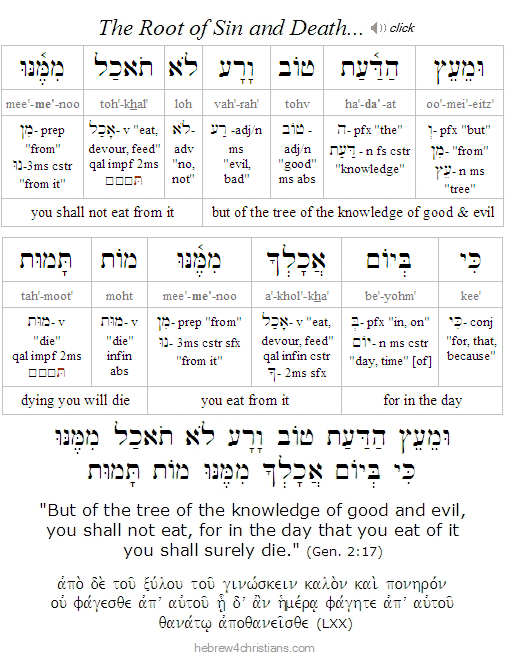 |
Note: It may be wondered why we would say that God is humble... Well, it is certainly true that the LORD is self-effacing, self-forgetting, utterly unselfish, absolutely noble of heart, and so on. Moreover we are commanded to emulate God, who is merciful, gracious, slow to anger, abounding in steadfast love, etc. (Exod. 34:6-7). Most of all we are to follow the example of Yeshua, YHVH in the flesh, who willingly emptied Himself and took the role of a humble servant (Phil. 2:6-7). Yeshua himself said, "Take my yoke upon you, and learn from me, for I am gentle and lowly in heart, and you will find rest for your souls" (Matt. 11:29).
The War for Truth...

[ The following is related to our Torah reading for this week, parashat Bereshit... ]
10.01.21 (Tishri 25, 5782) We are in the midst of a great spiritual war -- the war for the truth. This has been the battle from the beginning. The very first words of evil (הַנָּחָשׁ) questioned and garbled God's truth: אַף כִּי־אָמַר אֱלֹהִים לֹא תֹאכְלוּ מִכֹּל עֵץ הַגָּן - "Did God really say you shall not eat from all the trees of the garden?" (Gen. 3:1). The test of the orchard was therefore the test of teshuvah - that is, whether Adam and Eve would turn to God or turn to evil. Satan's deceptive appeal to Eve was that the fruit of the Tree of Knowledge would give her wisdom that would make her "like God," knowing both good and evil. The essence of temptation focused on her pride and her desire to acquire wisdom using her own autonomous reasoning. The fruit represented self-will and the abandonment of God's rule as King of the universe. Eve's sin was ultimately that of unbelief (which is the reason why we must be saved by faith, as a reversal of the original sin). When she ate the forbidden fruit, the body (carnality) became the central focus and shame was the result.
The Hebrew word for truth (i.e., emet: אֱמֶת) implies more that descriptive correspondence to include faithfulness and trust; it is both cognitive (emunah) and emotive (bittachon). In the end there will be found two types of people: those who love the truth and those who love the lie; these are children of light (בְּנֵי הָאוֹר) and children of darkness (בְּנֵי הַחשֶׁךְ), respectively. Followers of Yeshua the Messiah are told to "walk as children of light" / ὡς τέκνα φωτὸς περιπατεῖτε (Eph. 5:8). Children of light are called to be am kadosh - a holy people - separate from the evil engendered by the fallen world and its forces, just as the very first creative expression of God was the separation of light from darkness (Gen. 1:3-4). The children of light "hate evil and love the good," and conversely, the children of darkness "hate the good and love evil" (Psalm 34:21, Prov. 8:13, Amos 5:15, John 3:20-21). Yes, we hate sin, because sin separates people from healing; we hate sin but we love others. We are to walk in the peace and love of God; to do acts of justice and lovingkindness (Psalm 97:10). "No one can serve two masters, for either he will hate the one and love the other, or he will be devoted to the one and despise the other."
In a sense, the history of humanity - especially as it has been expressed philosophically and politically through the centuries -- has been nothing less than the collusion to redefine reality as something that it isn't. "The kings of the earth station themselves, and the dignitaries (רוֹזְנִים) take counsel together against (lit. "over") the LORD and His Mashiach" (Psalm 2:1-3). Spiritual warfare is therefore the fight for sanity and truth in a world that prefers madness and self-deception...
Be vigilant! If the devil can't kill you, he will try to drive you insane... He will lie to you about who you really are... He he will harass you and vex your soul. He will whisper fearful things in your ear... He will make what is small seem big and what is big seem small. He will raise dark suspicion within your soul, causing you to walk in mistrust. He will remind you of your sins to make you feel ashamed and dirty. He will hiss that you are unlovable and unworthy. He will argue on behalf of your flesh that you deserve better than this... He will tempt you to seek relief in cisterns of emptiness and futility. Most of all, he will try to cast a spell to make you forget that you are truly a prince or princess of God Almighty... The devil seeks to drive you into the exile of loneliness and despair. Submit yourself to God and refuse to heed voices of fear or shame. Da lifnei mi attah omed: "Know before whom you stand!"
There are two basic approaches to "spiritual warfare." The first is to discern the presence of evil and then pray for God's intervention, deliverance, protection, and so on. The second is to use ayin tovah and focus on God instead - to "set your thoughts on things above" (Phil. 4:8). Whereas the former approach may at times seem necessary to dissipate encroaching darkness to find inner peace, the latter approach has the decided advantage of trusting in the Divine Presence that pervades and overrules all things (Psalm 16:8). When David was surrounded by the enemy, he kept focused on the glory of the LORD. David knew that God would shelter him and elevate him above the powers of darkness (Psalm 27:1-6). The highest form of spiritual warfare, then, is to consciously turn away from fear by choosing to praise the LORD God, magnifying His Name, and walking before Him in awe...
יהוה אורי וישׁעי ממי אירא
יהוה מעוז־חיי ממי אפחד
Adonai · oh·ree · ve·yeesh·ee · mee·mee · ee·rah
Adonai · ma·ohz · chai·yai · mee·mee · ef·chad

"The LORD is my light and my salvation; whom shall I fear?
The LORD is the strength of my life; of whom shall I be afraid?"
(Psalm 27:1)
Hebrew Study Card

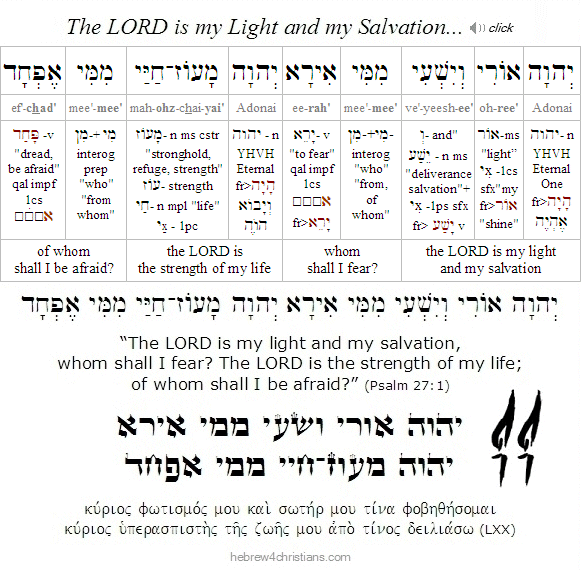
Surely our great need is to have heart, to find strength, resolution, and steadfast determination to walk boldly during these heartless and depraved days (2 Tim. 3:1-5). We are not without God's help, of course. Yeshua told us that the Ruach HaKodesh (רוּחַ הַקּדֶשׁ) would be "called alongside" (παράκλητος) to comfort us on the journey. The English verb "comfort" literally means "to give strength" (from com- ["with"] and fortis ["strong"]), an idea similarly expressed by the verb "encourage," that is, to "put heart [i.e., 'core'] within the soul." In Hebrew, the word courage is expressed by the phrase ometz lev (אמֶץ לֵב), meaning "strong of heart," denoting an inner quality of the will rather than of the intellect. Our faith is the victory that overcomes the world (1 John 4:4, 5:4).
Fear is the primary tool of the devil and the underlying motive behind sin itself (Rom. 14:23). Beloved, "do not be overcome by evil, but overcome evil with good" (Rom 12:21). Always focus on Yeshua, the Light of Torah (האור של תורה) and the true Wisdom of God (חָכְמַת אֱלהִים): "Whoever has My commandments (מִצְוֹתַי) and keeps them, that is the one who loves me. And the one who loves me will be loved by my Father, and I will love him and will manifest (lit., "shine within" from ἐν, "in" + φαίνω, "shine") myself to him" (John 14:21). There it is - the Source of the Light that overcomes all darkness; the Power that is behind the armor of God... Yeshua is the Beginning, the Center, and the End of all true meaning from God. Blessed is His Name forever and ever...
Alphabet and Creation...
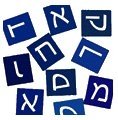
[ The following is related this week's Torah reading, parashat Bereshit... ]
10.01.21 (Tishri 25, 5782) The Torah begins with the letter Bet (בּ) rather than the letter Aleph (א) to denote God's humility. The letter Aleph is the first letter, the king of the alphabet, and the letter that begins "I AM" (i.e., אנכי) - the first word of the Ten Commandments. The letter Bet, on the other hand, is the second letter that means "house" or "home" (בּית). This suggests that the Torah begins with the focus not on the "I" but on creation, the household of God. And though God did not wish to be the center of attention, so to speak, Aleph and Bet together spell the word "father" (אב), that is, the One who oversees the household of the world in love. As it is written, "Every good gift and every perfect gift is from above, coming down from the Father of lights (אֲבִי הַמְּארוֹת) with whom there is no variation or shadow due to change" (James 1:17).
Hebrew Lesson:
Psalm 100:5 Hebrew reading (click):
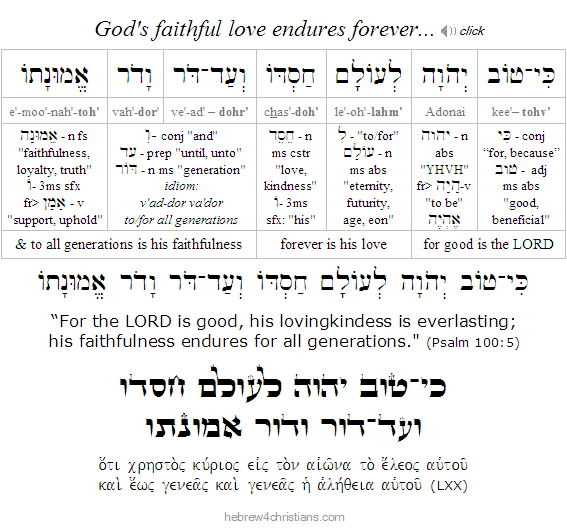 |
<< Return
|









